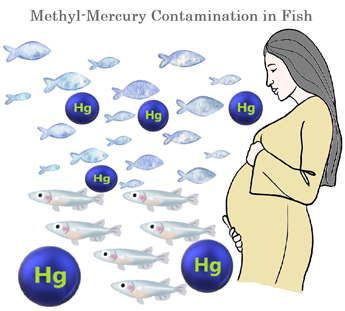Mercury in Fish: What You Need to Know
The concern with eating fish is mercury contamination, particularly in the toxic form known as methylmercury. Methylmercury is produced when mercury in ocean sediments is transformed by microorganisms.
Fish absorb it through their gills and digestive tracts. Mercury binds tightly to proteins in muscle tissue, and cooking or food preparation does not reduce it.
As small fish are eaten by larger fish, mercury levels increase up the food chain. This means large predatory fish such as shark, king mackerel, and tilefish contain the highest levels of mercury and should be avoided.

Fish as Part of a Healthy Diet
Including fish in the diet offers significant health benefits. Fish is:
A diet rich in seafood protects against cardiovascular disease, supports neurological development, and remains a cornerstone of a balanced diet.
Mercury Levels in Fish:
Mercury in fish is not the same across all species. Levels vary depending on several factors, including:
Generally, predatory fish—those that feed on other fish—are larger and live longer. As a result, they accumulate more methylmercury in their tissues, making them higher risk for human consumption.
High-Mercury Fish to Avoid
Certain species are known to contain high mercury levels and should be eaten rarely or avoided, especially by pregnant women, and children. These include:
-
Shark
-
Ray
-
Swordfish
-
Bluefin Tuna
Balancing Risks and Benefits of Eating Fish
While nearly all fish and shellfish contain traces of mercury, the health benefits of eating fish far outweigh the risks—as long as you avoid high-mercury species. Safer, low-mercury fish options include:
Mercury and Pregnancy: Why Extra Care Is Needed
Pregnant women, nursing mothers, and young children are most vulnerable to mercury exposure. Mercury from fish can pass through the placenta, potentially affecting a baby’s developing brain and nervous system. Effects may show up later as delayed milestones, reduced memory, or shorter attention span.
Breast milk mercury levels are generally low and not considered risky for infants. The body can eliminate mercury gradually, but eating high-mercury fish regularly over many months can lead to unsafe levels.
FDA Guidelines on Fish Consumption
The FDA recommends safe seafood consumption as follows:
-
Adults: Eat up to 12 ounces (two average meals) per week of a variety of cooked seafood, avoiding large predatory fish.
-
Pregnant or breastfeeding women and children under 12: Eat 8–12 ounces per week of low-mercury fish such as salmon, shrimp, pollock, catfish, or canned light tuna.
-
Limit albacore tuna to 6 ounces per week.
-
Serve children smaller portions based on age.
-
Local fish advisories: Check safety guidelines for fish caught in local lakes, rivers, or coastal areas. If no advisory is available, limit intake to 6 ounces per week for adults and 1–3 ounces for children, depending on age.
Eating fish is one of the best ways to support heart health, brain development, and overall nutrition. By making smart seafood choices, you can enjoy the benefits of fish without worrying about the risks of mercury exposure.
Medical Disclaimer.
Read further on:
≺≺ Which food is most associated with helping people live longer?
≺≺ Is Plant-Based Protein the Key to a Longer, Stronger Life?
≺≺ How important is fiber in the diet?
≺≺ What role do probiotics play in the diet?
≺≺ What Is the Ketogenic Diet? Is the Keto Diet Right for Everyone?
≺≺ What cardiovascular benefits do berries provide?
≺≺ What is the Okinawan diet? What is the secret behind Okinawan long life-expectancy?
≺≺ Ultra-Processed Foods: What They Are, Why They’re Harmful, and How to Cut Back.
≺≺ What grains have the lowest glycemic index?
≺≺ How Important Is Protein for Your Health?
≺≺ is your kid getting too much protein?
≺≺ What foods and vitamins are good for your skin?
≺≺ EWG’s- The Clean Fifteen: Fruits and Vegetables with the Lowest Pesticide Levels.
≺≺ What eating strategies work best for losing weight long term?
≺≺ How Do Sugary Meals and Beverages Harm Dental Health?
≺≺ Why Vitamin B12 Is Important for Your Health?
≺≺ What foods should people with high blood pressure avoid?
≺≺ Why is regular table salt considered unhealthy?
≺≺ What food is most effective for moderating blood sugar?
≺≺ What are antioxidants? How antioxidants in the fruits and vegetables help in preventing cancers and diseases?
≺≺ How can I reduce the risk of cancer-causing chemicals when cooking or grilling meat?
≺≺ What happens to my blood vessels when I gain weight?
≻≻ Watch this page for more such informative articles on Health, Nutrition, and Wellness.
≻≻-Back to Home page.
Further reading (External Links opens in new window):
≺≺- Department of Health, State Government of Victoria, Australia – Mercury in fish.
≺≺- Harvard Health Publishing – What to do about mercury in fish.

